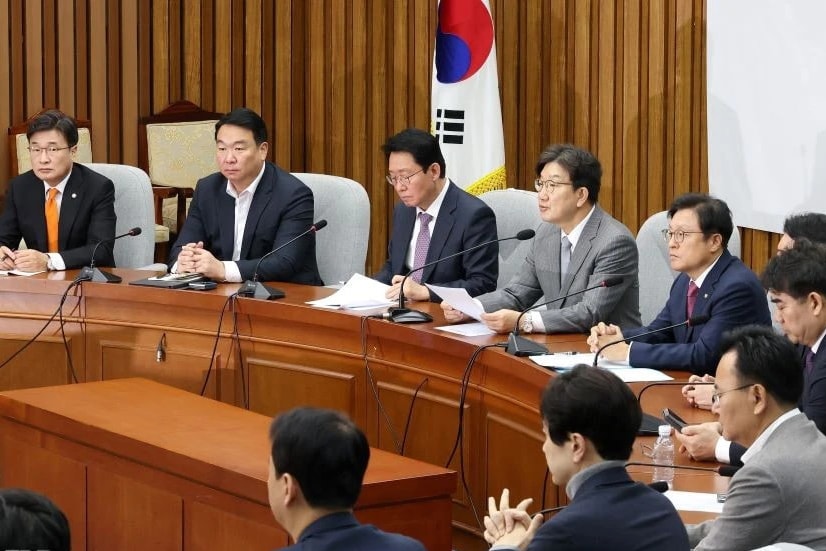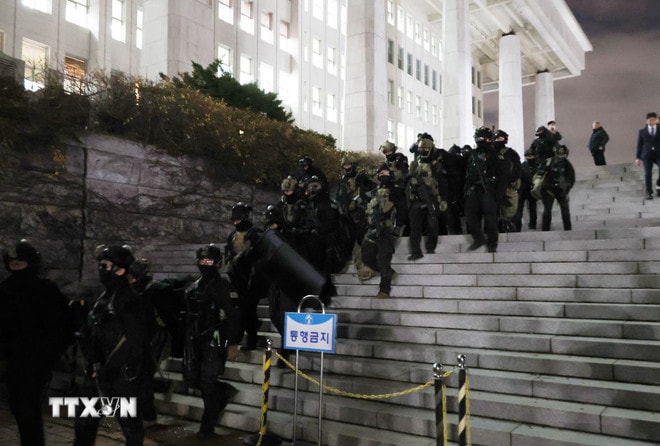The political crisis has weakened Seoul's ability to cooperate with the Trump 2.0 administration on key policies related to trade, the Russia-Ukraine conflict and China.

South Korean politics, already deeply divided, was thrown into chaos after President Yoon Suk Yeol declared martial law.
Although martial law only existed for a very short time, the consequences left behind can be said to have affected all aspects of socio-economic life. The biggest question now is when will this instability end?
President Yoon Suk Yeol's brief imposition of martial law has had unpredictable consequences, both domestically and internationally, causing the biggest political crisis in decades in South Korea.
Domestically, South Korean politics are in turmoil with the entire cabinet, including Prime Minister Han Duck Soo and ministers, including Defense Minister Kim Yong Hyun and Interior Minister Lee Sang Min, having resigned, been arrested, investigated or impeached.
Along with that, the high-ranking defense leadership system including a series of generals, including General Park An Su, Chief of Staff of the South Korean Army, was arrested.
The economic sector is one area where the negative impact is most visible. Stock and foreign exchange markets both plummeted immediately after martial law was imposed.
Despite the South Korean government's efforts to stabilize the market and reassure investors, the Korean won fell to its lowest level in 15 years on December 19. The exchange rate between the Korean won and the US dollar exceeded 1,450 won/USD for the first time since the record on March 13, 2009.
In the context of stagnant domestic demand, declining exports, factors such as high interest rates, high exchange rates, and political instability have increased pressure on businesses and investors both inside and outside Korea.
In terms of foreign affairs, Foreign Minister Cho Tae Yul admitted that martial law had weakened the “political momentum” of the Korea-US alliance and that there had been some disruptions in communication in the two weeks following martial law. It was also noticeable that high-level visits to Korea from various countries were canceled or postponed. This somewhat affected Korea’s diplomatic efforts.
As South Korea is implementing its strategy to become a Global Powerhouse (GPS) and strengthen its role in bilateral and multilateral forums to match its status as the world's 12th largest economy, political turmoil has delayed the process.

The political crisis comes at an inopportune time when the South Korean leader needs to engage in intense diplomatic efforts to establish a framework for close cooperation with the incoming administration of US President-elect Donald Trump.
Troy Stangarone, an expert at the Wilson Center in the US, said that the political crisis in South Korea has weakened Seoul's ability to cooperate with the Trump 2.0 administration on important policies related to trade, the Russia-Ukraine conflict and the China issue.
According to this expert, if there were no current political crisis, Seoul would have resolved issues related to Sino-US relations to protect South Korea's economic and technological interests when the upcoming US administration plans to impose new tariffs or export controls on Beijing.
Meanwhile, both Seoul and Washington increasingly need to maintain close security coordination to effectively respond to what they say are North Korea's growing nuclear and missile threats as well as its deepening military ties with Russia.
The Constitutional Court of South Korea has 180 days to make a final decision on whether to impeach President Yoon Suk Yeol. This process requires enough time to collect evidence and come to a conclusion. In the event that he survives the impeachment, he will continue to serve as president.
However, the opposition’s control of 192 seats in the National Assembly and the 12 ruling party lawmakers who voted to pass the impeachment motion will certainly make this leader a “lame duck president” in the final stages of his term. Conflicts within the ruling People’s Power Party (PPP) will weaken the party.
In the scenario where President Yoon Suk Yeol is convicted, things could be much more complicated. A snap election would then be held, with a tight race between the opposition itself.

Whether they like it or not, the major political parties in South Korea - specifically the ruling PPP and the opposition Democratic Party (DP) - are preparing for an early presidential election in the event that President Yoon Suk Yeol is found guilty. The internal turmoil suggests that South Korean politics will continue to be a fierce struggle in the coming time.
Economists are inclined to argue that an early presidential election after the Constitutional Court's impeachment of President Yoon Suk Yeol would be the friendliest scenario, helping the market quickly overcome volatility and stabilize again.
Many analysts predict that a new president and government will pursue economic stimulus measures through loose fiscal policies, said Kang Seung Won, an analyst at Investment & Securities Bank.
While uncertainties will persist for about three months while the Constitutional Court conducts its impeachment, the timeframe seems to be set and the market will initially be negative on sentiment but will then react to the global economic cycle.
The main opposition Democratic Party is expected to begin preparations for an early presidential election. If the Constitutional Court decides to impeach President Yoon Suk-yeol, a presidential election will be held within 60 days. Accordingly, it is likely that the Democratic Party will move to make Party Chairman Lee Jae-myung the sole opposition presidential candidate.
A DP official said the politician is expected to focus on the people's economic program to highlight his role and ability to govern. The DP is trying to rally unity to change the government.
However, while President Yoon Suk Yeol is facing impeachment proceedings, Mr. Lee Jae Myung also faces other legal risks related to a total of 5 cases, including an appeal trial related to charges of election fraud, corruption...
It can be seen that the more factions fight, the wider the political instability and the negative impact on all aspects from socio-economics to national security and defense and even people's welfare. This is the reason why many analysts have pointed out that there will be no winner in this prolonged political crisis in Korea.
TB (according to VNA)